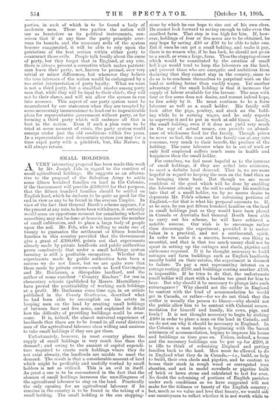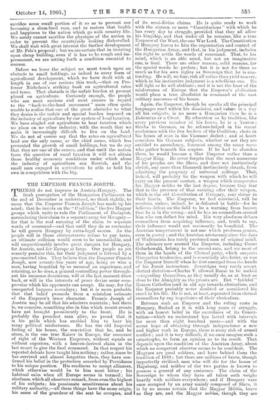A VERY interesting proposal has been made this week tl
by Mr. Joseph Fels in regard to the creation of small agricultural holdings. He suggests as an alterna- tive to the proposal of the Salvation Army to settle some fifteen hundred families on land. in the Colonies, if the Government will provide £300,000 for that purpose, that the fifteen hundred families should be settled on English land, which he declares to be quite as good for the end in view as any to be found in the oversea Empire. In view of the fact that General Booth's scheme appears, for the present at any rate, to have been withdrawn, it certainly would seem an opportune moment for considering whether something may not be done at home to increase the number of small cultivators, and to place a large body of people upon the soil. Mr. Fels, who is willing to make one of twenty to guarantee the settlement of fifteen hundred families in this country provided that the Government give a grant of £300,000, points out that experiments already made by private landlords and public authorities prove conclusively that under a small holdings system farming is still a. profitable occupation. Whether the experiments made by public authorities have been a success we do not know, but we are quite sure that those made by private owners—such as Lord Carrington and Mr. Buchanan, a Shropshire landlord, and the author of some excellent "Country Headers" for use in elementary schools (published by Messrs. Macmillan)— have proved the practicability of working such holdings at a profit. Mr. Buchanan some time ago, in an article published in the County Gentleman, described what he had been able to accomplish on his estate in keeping men on the land by creating small holdings of between four and five acres, and explained in detail how the difficulty of providing buildings could be over- come. It is, indeed, the almost universal experience of landlords that there are to be found in all rural districts men of the agricultural labourer class willing and anxious to take small holdings if they can get them.
Unfortunately, however, in most country places the supply of small holdings is very much less than the demand ; and owing to the amount of capital expendi- ture required to create such holdings where they do not exist already, the landlords are unable to meet the demand. The result is that a considerable amount of land which might be profitably and usefully worked by small holders is not so utilized. This is an evil in itself. As great a one is to be encountered in the fact that the absence of small holdings increases the unwillingness of the agricultural labourer to stay on the land. Practically the only opening for an agricultural labourer if he remains in the country is to be found in the taking of a small holding. The small holding is the one stepping- stone by which he can hope to rise out of his own class. He cannot look forward to saving enough to take even the smallest farm. That step is too high for him. If, how- ever, holdings of four or five acres are to be obtained, he may hope by saving £40 or £50 to be able to take one. But if once he can get a small holding, and make it pay, there is no reason why, if he has luck, he should not go on to a small, or even a large, farm. Thus the stepping-stones which would be constituted by the creation of small holiins would tend to keep the labourers on the land, and prevent those who are energetic and ambitious from declaring that they cannot stay in the country, since to do so is to condemn themselves to perpetual work on the land at nothing better than weekly wages. Yet another advantage of the small holding is that it increases the supply of labour available for the farmer. The man with four or five acres does not desire, and cannot indeed hope, to live solely by it. He must continue to be a farm labourer as well as a small holder. His family will look after the pigs, poultry, and stock on the hold- ing while he is earning wages, and he only expects. to supervise it and to put in work at odd. times. Lastly, the small holding, even if it does not yield very much in the way of actual money, can provide an abund- ance of wholesome food for the family. Though prices be never so bad, the man and his family can at any rate consume, very much to their benefit, the produce of the holding. The mere labourer when he is out of work or only half employed suffers much more in health and happiness than the small holder.
For ourselves, we feel most hopeful as to the increase of small holdings, if they are called into existence, to meet a definite local demand. That is, we are more hopeful in regard to keeping the men on the land than as to bringing them back. But though we are more confident of the good which will be done by enabling the labourer already on the soil to enlarge his condition into that of a small holder, we by no means desire to deprecate Mr. Fels's scheme for colonising portions of England,—for that is what his proposal amounts to. If, as he says, he can put fifteen hundred families on the land in small holdings just as they would have been placed in Canada or Australia had General Booth been able to carry out his scheme, he will have achieved a notable success. Our wish is to encourage rather than discourage the experiment, provided it is under- taken in a practical, and not a • sentimental, spirit. In order to make it a success, however, one thing is essential, and that is that too much money shall not be spent in setting up the cottages and sheds, pigsties and outhouses required. If it be thought necessary to build cottages and farm buildings such as English landlords usually build on their estates, the experiment is doomed to failure. To pay a rent representing interest on a cottage costing £250, and buildings costing another £150, is impossible. If he tries to do that, the unfortunate small holder will start with a burden too great for him to bear. But why should it be necessary to plunge into such extravagance ? Why should not the settler in England be content with the kind of accommodation he would get in Canada, or rather—for we do not think that the settler is usually the person to blame—why should not the public allow him to be content with Colonial accom- modation for himself and family, his cows, pigs, and fowls ? It is not thought necessary to begin by sinking £400 in order to place a man on the land in Canada, and we do not see why it should be necessary in England. In the Colonies a man makes a beginning with the barest minimum of accommodation, hoping to improve his house and buildings as time goes on. -Unless, indeed, a house and the necessary buildings can be put up for £200, it is idle to think of colonising England and getting families back to the land. Men must be allowed to do in England what they -do in Canada,—i.e., build, or help to build, their own sheds and pigsties, and be content to house their stock in rough wood or corrugated iron shanties, and not in model cowsheds or pigsties built of brick or hewn stone and calculated to last for ever. No doubt the colonising of portions of English parishes under such conditions as we have suggested will not make for the tidiness or beauty of the English country ; but, much as we value and love that beauty, we would ask our countrymen to reflect whether it is not worth while to
sacrifice some small portion of it so as to prevent our becoming a slum-bred race, and to restore that health and happiness to the nation which go with country life. We surely cannot sacrifice the physique of the nation in order to prevent the countryside looking dishevelled. We shall wait with great interest the further development of Mr. Fels's proposal ; but we are certain that in insisting upon cheap building, even if it has to be rough and im- permanent, we are setting forth a condition essential to success.
Before we leave the subject we must touch upon an obstacle to small holdings, as indeed to every form of agricultural development, which we have dealt with at length in one of our reviews this week,—that on Pro- fessor Nicholson's striking book on agricultural rates and taxes. That obstacle is the unfair burden at present placed on agriculture. Curiously enough, the people who are most anxious and most sincere in regard to the "back-to-the-laud movement" seem often quite unable to realise that one of the great obstacles to what they desire is the unfair and special burden imposed on the industry of agriculture by our system of local taxation. We have singled' out agriculture to bear taxation which we place on no other industry, with the result that we make it increasingly difficult to live on the land. We do not of course say that the rates on agricultural land are the only cause, or the chief cause, which has prevented the growth of small holdings, but we do say that they are one of the causes, and that until the nation faces the question of rural taxation it will not obtain those healthy economic conditions under which alone the industry of agriculture can flourish, and the small man engaged in agriculture be able to hold his own in competition with the big.















































 Previous page
Previous page